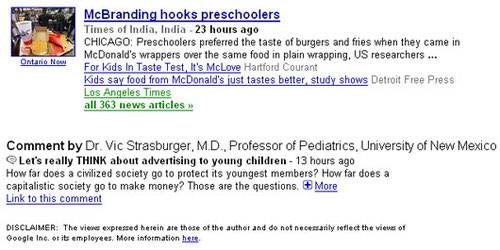Google announced a new feature today for their Google News web site that allows people involved in news stories to post dissenting (or concurring) view points next to published news items. From the Google News Blog:

“We’ll be trying out a mechanism for publishing comments from a special subset of readers: those people or organizations who were actual participants in the story in question. Our long-term vision is that any participant will be able to send in their comments, and we’ll show them next to the articles about the story. Comments will be published in full, without any edits, but marked as “comments” so readers know it’s the individual’s perspective, rather than part of a journalist’s report.”
In order to send comments to Google, those “special” readers will need to email Google with a link to the story they’re commenting on, and a way for Google to authenticate their identity. (More information on their help page.)
Tony Hung thinks this is a game changer because it allows those involved in stories to tell their side of the story without it being filtered through a reporter. But I don’t really agree.
Comments appear directly below news links (highlight added).

While it is certainly important for news organizations to offer dissenting views, this feels like an odd choice for Google for a couple of reasons. First, this is a very “web 1.0” feature. Rather than encouraging an open discussion on news topics, Google is perpetuating a closed debate between newsmakers and journalists. And they’re using a clunky, slow medium (email) to do it. With many mainstream news organizations adding mechanisms for instant feedback from readers, and offering ways for readers to submit news items themselves, I’m not sure if this feature is really all that compelling.
Further, many news organizations already offer methods for editorial response. And isn’t the blogging revolution, at least in part, about telling your side of the story without having to go through the mainstream press? Google News offers another outlet for people to be heard, and for that they can be applauded, but I don’t think they’re “bringing a revolution to news,” as Tony Hung argues, unless he’s talking about the way Google News aggregates blog content alongside mainstream press reports (which is somewhat revolutionary, but something they’ve been doing for awhile).
Secondly, as Steve Rubel points out, Google is now venturing into the realm of original content. They will now be publishing content (if not expressly producing it), and opening themselves up to potential headaches they didn’t have to deal with in the past. Editorial content has traditionally been Yahoo!’s domain, and with Yahoo!’s News site still the dominant force in online news, maybe it is not so surprising that Google is trying to follow suit.

I agree completely with Rubel’s analysis:
“Google gets points for opening up their platform to comments from sources but I would had rather have seen them make it more democratic and have this open to everyone. In being selective, the move is more fraught with risk as Google begins to make editorial decisions that might not be popular. A better way to manage this might be to have a system that lets everyone comment, yet also delineates those from official sources that are mentioned in a particular story.”
Further, Ars Technica makes a good point in their write up of today’s announcement. Some publishers have already been wary of Google News for publishing their headlines and excerpts without compensation. The prospect of unfiltered and possibly negative reactions from outside sources alongside those links isn’t going to make those skeptical publishers change their minds.
Check out a Google News comment here.
What do you think about Google News’ new feature? Leave your thoughts in the comments below (or email them to Google News — kidding…).

















